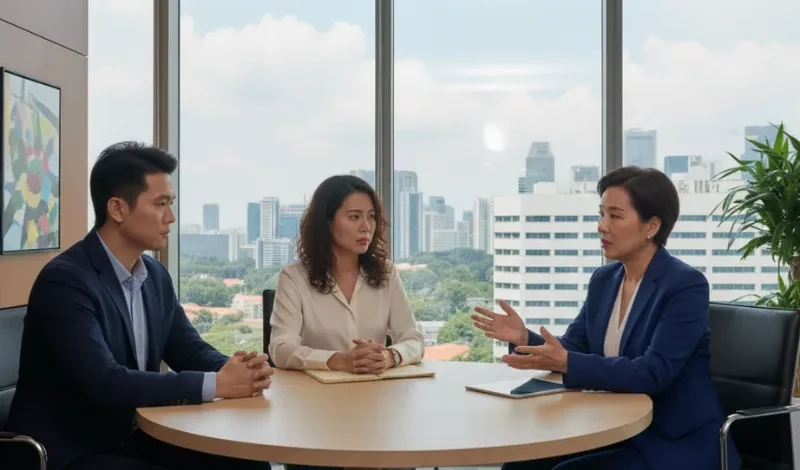If you are going through the divorce process, it is highly likely that your lawyer would have discussed the possibility of engaging in mediation. In Singapore, the legal system aims to ensure that divorcing couples resolve their issues amicably, if possible. One key aspect of the divorce process is mediation.
Mediation is a confidential and non-confrontational way to resolve disputes regarding the division of assets, custody of children, maintenance issues and other matters which may arise during a divorce. In such a sensitive process, the role of a divorce lawyer is crucial.
What is Mediation?
Mediation in divorce proceedings is an alternative dispute resolution (ADR) method where both parties, under the guidance of a neutral third party (the mediator), try to reach a mutually agreeable settlement. Mediation is encouraged as it can be less expensive, quicker, and less adversarial than a Court trial.
The Courts emphasise mediation as an essential step in the divorce process. Under the Family Justice Act 2014, divorce cases are referred to Family Dispute Resolution (FDR) where parties are encouraged to settle their issues through mediation. A skilled mediator, often a court-appointed professional, works with both parties to help them reach an agreement on contested issues.
However, despite mediation being a more amicable and informal process, it is still legally binding once an agreement is reached and formalised by the court. Given this, having a divorce lawyer present during the mediation can make a significant difference to how the case is handled.
Why is Mediation Important in Divorce Cases?
Mediation offers numerous advantages over a traditional courtroom battle, especially in the emotionally charged environment of divorce, such as:
- Confidentiality: Mediation is confidential, which means that any agreements or discussions cannot be used against either party in future litigation. This is particularly important when personal issues such as child custody or financial arrangements are involved.
- Cost-Effectiveness: A lengthy courtroom battle is expensive and time-consuming. Mediation, on the other hand, is typically less costly, as it avoids extensive court proceedings.
- Faster Resolution: Mediation is generally faster than waiting for a Court date.
- Preservation of Relationships: Since mediation is less adversarial, it allows divorcing couples to engage in cooperative discussions, which may help preserve relationships, especially when there are children involved. This is crucial for future co-parenting.
- Flexibility: The parties have more control over the outcome of the mediation. They are not bound by the rigid structure of Court decisions but can instead create a customised solution that works for both.
What Role Does a Divorce Lawyer Play in Mediation?
While mediation aims to provide a neutral ground for the parties, having a divorce lawyer present is essential to ensure that your legal rights are protected.
1. Advising and Protecting Legal Rights
One of the most significant roles of a divorce lawyer during mediation is to ensure that their client’s legal rights are protected. While mediators help both parties come to an agreement, they are not there to provide legal advice. A divorce lawyer is an advocate for their client’s interests and will make sure that any settlement aligns with the law and ensures fair treatment.
For example, if the proposed agreement violates the client’s rights under the law (such as the fair division of assets or an appropriate child custody arrangement), the lawyer can point this out and negotiate better terms.
2. Drafting and Reviewing Legal Documents
Once a settlement is reached during mediation, it must be formalised. A divorce lawyer ensures that the drafted agreement is legally sound and binding. Lawyers help in drafting the final divorce settlement or consent orders, ensuring that the terms are clear and comprehensive. If any terms are vague or unclear, a lawyer will raise these issues with the mediator or opposing solicitor to ensure the agreement is drafted well.
In some cases, a lawyer may also need to review any pre-existing agreements, such as prenuptial agreements, to determine whether they still apply or should be amended.
3. Guiding Clients Through the Legal Process
Mediation can be emotionally taxing, and many individuals may not be fully aware of their legal options. A divorce lawyer helps clients by providing guidance and clarity on the process. They will explain the potential legal outcomes of the mediation, help assess whether the mediation agreement is fair and reasonable, and clarify how the agreement will impact the client’s future, especially in terms of financial obligations and child custody.
4. Negotiating Fair Settlements
Divorce mediation is based on negotiation, and having an experienced lawyer who understands both the law and negotiation strategies can be extremely advantageous. Lawyers are skilled in negotiating settlements that protect their clients’ interests. If one party is at a disadvantage in terms of financial knowledge or negotiating skills, the lawyer ensures their client’s position is well-represented and that they are not coerced into agreeing to terms that are not in their best interests.
Divorce lawyers also play a role in managing expectations. They will make clients aware of what they can realistically expect from mediation, based on the facts of the case and the relevant legal principles. This realistic perspective helps avoid unrealistic demands that could derail the mediation process.
5. Providing Emotional Support and Guidance
While the primary role of a divorce lawyer is legal, they also play an important psychological role during the mediation process. Divorce is often a difficult and emotionally draining experience, and a divorce lawyer can provide much-needed emotional support. While they are not therapists, lawyers can help calm their clients’ anxieties and provide reassurance. Having a lawyer by your side during mediation can alleviate some of the emotional strain of the process and give clients the confidence to move forward.
6. Ensuring Compliance with Court Orders
Once a divorce settlement is reached, the lawyers will ensure that the terms of the mediation agreement are legally binding by filing them with the Court. In Singapore, any agreement reached in mediation can be turned into Court orders which are binding and enforceable. If either party fails to comply with the agreement, a lawyer can help initiate enforcement action to ensure compliance.
When Should You Hire a Divorce Lawyer for Mediation?
Hiring a divorce lawyer is advisable for anyone going through a divorce, whether they are seeking mediation or not.
- Complex Financial Assets: If there are significant assets involved, such as businesses, properties, or investments, a lawyer’s expertise is critical in ensuring that the division of assets is fair.
- Child Custody Disputes: If there are disputes regarding child custody or visitation rights, a lawyer will help ensure that the child’s best interests are prioritised, and any agreement complies with Singapore’s laws surrounding children’s welfare.
- Protection Against Unfair Terms: If one party has greater bargaining power or legal knowledge, a divorce lawyer helps balance the negotiations and ensure that their client is not taken advantage of.
- Negotiating Maintenance: If there is a need to negotiate spousal and/or child maintenance, a lawyer will ensure that the terms are fair and aligned with the applicable legal standards.
Ultimately, divorce mediation is designed to be less adversarial and more collaborative than traditional litigation. However, it is still a legal process that requires expert knowledge and guidance. Therefore, having a divorce lawyer during mediation is not only a good idea — it is often necessary for achieving a fair and favourable outcome.
As an experienced divorce lawyer in Singapore, I can provide you with the necessary legal and emotional support to help you through this challenging time. If you’re considering filing for divorce, contact me today at 8039 9083 for a consultation. Together, we can navigate the divorce process and help you move forward with your life.
If you need help with legal matters
Have a question or need more information? Just drop us a line!





